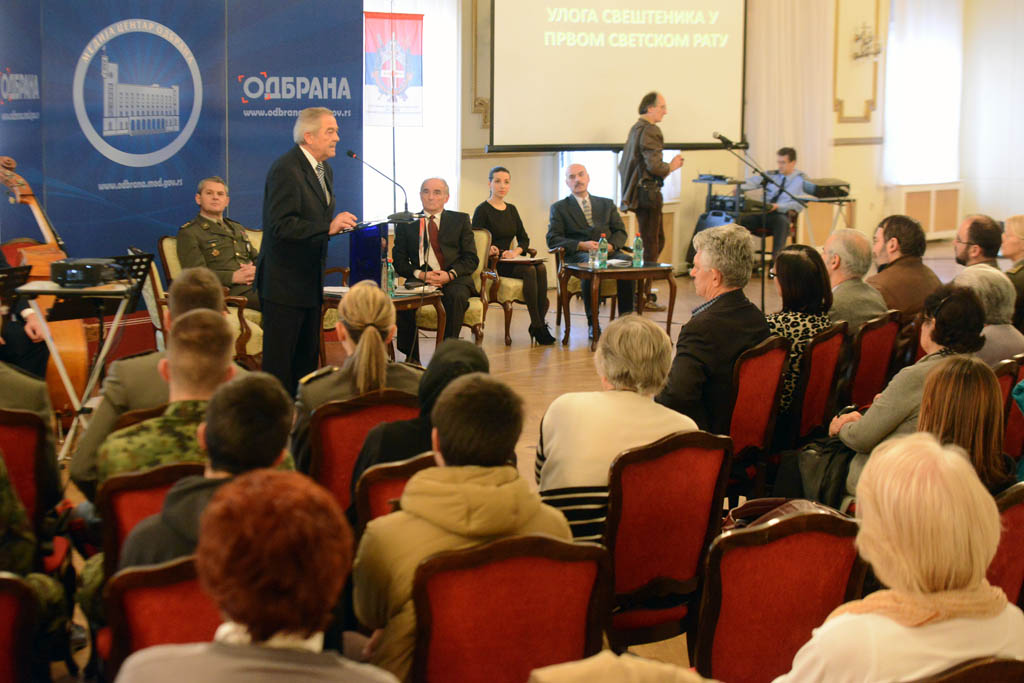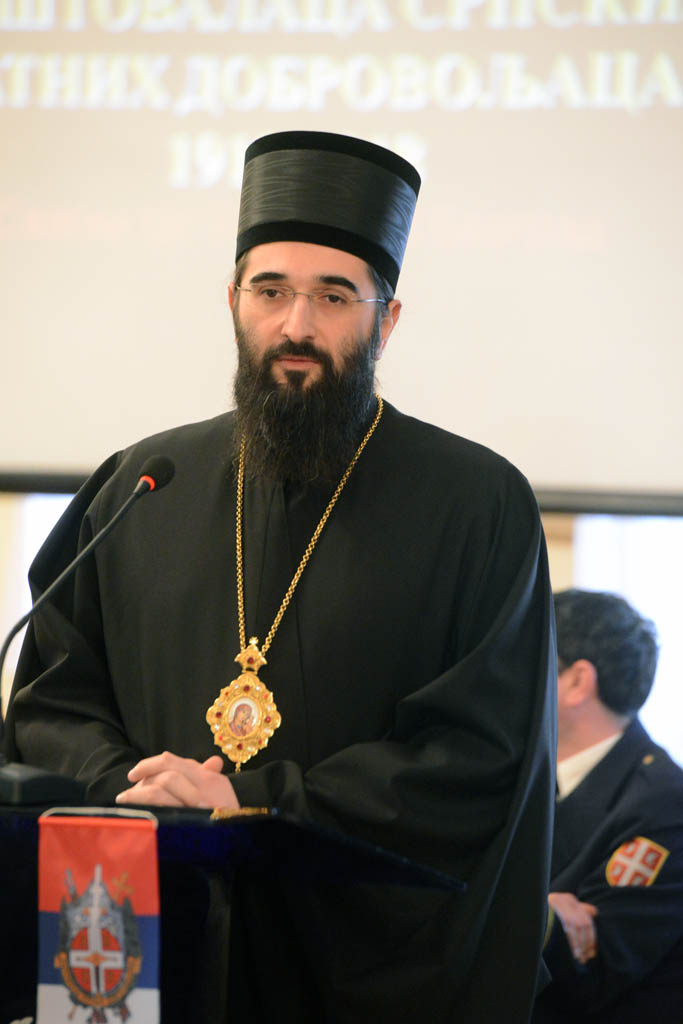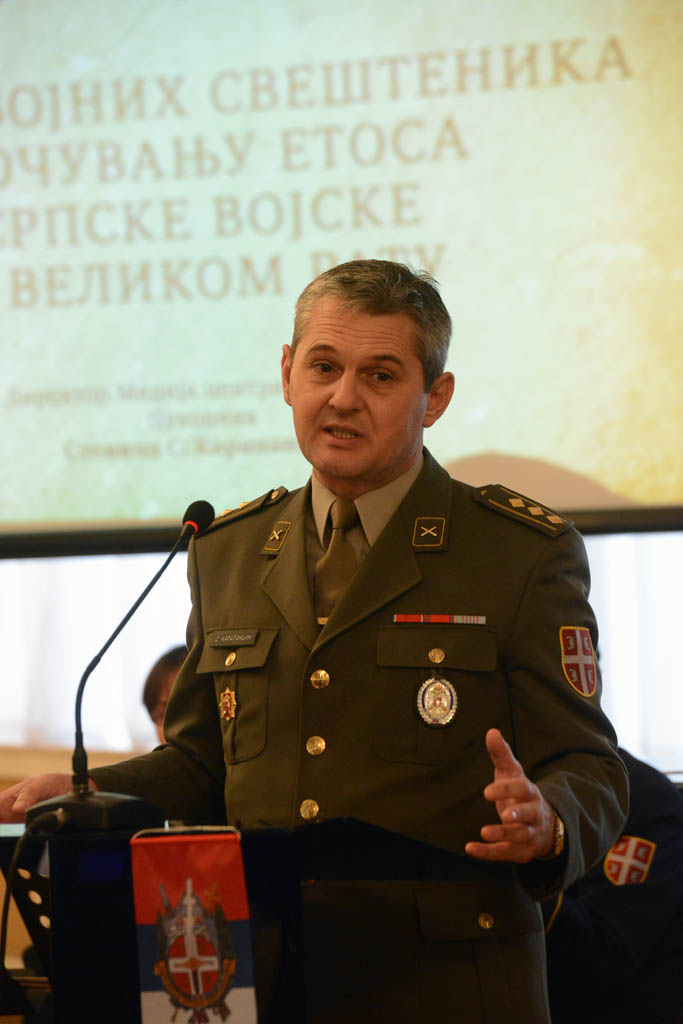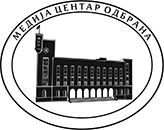23.12.2014
Lecture "Clergy in the Great War of Serbia" at the Central Military Club
 At the Gala Hall of the Central Military Club of Serbia, today, a lecture titled “Clergy in the Great War of Serbia” was held, organized by Odbrana Media Center in cooperation with the Association of volunteers of 1912 -1918 war, their descendants and followers.
At the Gala Hall of the Central Military Club of Serbia, today, a lecture titled “Clergy in the Great War of Serbia” was held, organized by Odbrana Media Center in cooperation with the Association of volunteers of 1912 -1918 war, their descendants and followers.On this occasion, speeches were given by: Director of Odbrana Media Center Colonel Stevica S Karapandzin, retired Colonel Rade S N Rajic, PhD and President of the Association of volunteers of 1912 -1918 war, their descendants and followers Vidoje Golubovic, PhD.

Conveying the blessing of His Holiness Serbian Patriarch Irinej, Bishop of Toplice Arsenije, Patriarch’s vicar stressed that the tradition of unity and cooperation between the Church and the Military dates backs as far as in 1803; three decades later, military clergy was introduced in the Principality of Serbia, and in the Great War, Serbian clergy stood side by side with their people and military.
Discussing the role of clergy in the Great War, Dr. Rajic stressed that clerical and military professions are traditional professions with a great influence on the psychological state of mind of a people. As he explained, those two services are joint in the times of war and unified in order to preserve what is imposed by circumstances of war, among which the spiritual aspect of helping the military in strengthening its moral military values has the priority.
Looking back on the difference between the historical events and circumstances of the Balkan Wars and the Great War, Dr. Rajic stressed that, during the Great Warm, almost a half of 3,200 clergy and monastic staff was killed, suffering, like the people, great losses in the war. He added that 192 clergy were a part of units of the Serbian military from 1912 to 1914, helping with their spiritual work on raising morale, preparation and breakthrough of Serbian regiments.
Colonel Karapandzin said that military clergy in the Serbian military a hundred years ago could also be a representation of today’s clerical service.
 - Military clergy with 75 years of experience had no difficulties during the Great War with understanding their role and tasks assigned by military authorities. The significantly contributed to preserving traditional national and religious values and a high level of morale in the toughest times of war. This is why the topic we are discussing today is a very important segment of this epopee, otherwise the least known one to the general public – Colonel Karapandzin said.
- Military clergy with 75 years of experience had no difficulties during the Great War with understanding their role and tasks assigned by military authorities. The significantly contributed to preserving traditional national and religious values and a high level of morale in the toughest times of war. This is why the topic we are discussing today is a very important segment of this epopee, otherwise the least known one to the general public – Colonel Karapandzin said.He stressed that it is the least known one because of the battle against memory, battle against religion that took place in our territory during the past century.
- While respecting certain opinions that everything related to the past and religion is retrograded and something that opposes some kind of a progress, I ask myself the question – do we need experiences from the Great War, even those related to the religious life in the Serbian Army? Having in mind the trials we are facing, they are our dire need of invaluable importance for the present and the future – Colonel Karapandzin said.
Vidoje Golubovic displayed photographs from the period of the Great War, featuring well-known and less-known military clergy and commanders. He spoke about archimandrite Milentije, Nicifor Ducic, Jakov Cupic, protoiereus Stevan Mihaldzic, the Serbian military and clergy in Bizerte, America, Corsica… He showed how the soldiers celebrated their slavas then, what regiment cemeteries look like, and stressed that members of the Association visit cemeteries each year to pay respects because “Serbia remembers and will thus live forever”.
The program included vocal soloist Aleksa Zarev and the quintet of the Art Ensemble of the Ministry of Defence Stanislav Binicki who performed compositions “There, Far Away” and “This is Serbia”.
 PHOTOGALLERY
PHOTOGALLERY
